 A large part of Easterseals’ success in achieving our mission – making profound, positive differences in the daily lives of people of all ages with disabilities, special needs, military backgrounds, and their families – is the collaborations we have with other like-minded organizations.
A large part of Easterseals’ success in achieving our mission – making profound, positive differences in the daily lives of people of all ages with disabilities, special needs, military backgrounds, and their families – is the collaborations we have with other like-minded organizations.
For National Dog Day (August 26), The Steven A. Cohen Military Family Clinic at Easterseals (Cohen Clinic) and Warrior Canine Connection (WCC) hosted an event together at the clinic to introduce a different type of therapeutic strategy for wounded warriors living with mental health issues: training service dogs.
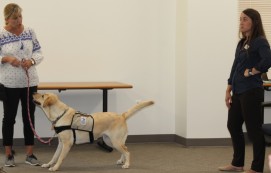 Two beautiful golden retrievers were introduced to the group by Emily McNeal, a veteran training program manager with Warrior Canine Connection. She was thrilled to introduce these canines to our veterans with the hope of drawing interests to WCC’s Mission Based Trauma Recovery (MBTR) program.
Two beautiful golden retrievers were introduced to the group by Emily McNeal, a veteran training program manager with Warrior Canine Connection. She was thrilled to introduce these canines to our veterans with the hope of drawing interests to WCC’s Mission Based Trauma Recovery (MBTR) program.
“Warrior Canine Connection’s program is unique in that we not only train service dogs for veterans, we also enlist them in the process,” said Emily McNeal, WCC service dog training instructor. “We deploy passionate and skilled trainers to teach dog psychology and commands using behavioral, cognitive and physical technique training. During the process, veterans are 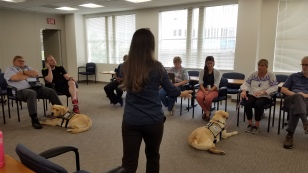 healing their relationships and families, discovering new ways to express themselves in a positive way, creating bonds working with our dogs and feeling a sense of accomplishment by seeing these dogs placed in a forever home. Through our partnership with the Cohen Clinic, we believe we can reach a greater veteran population of those desiring to continue the mission, seeking purpose since leaving the military, as well as participating in volunteer work that thrives on fulfilling the Warrior Ethos.”
healing their relationships and families, discovering new ways to express themselves in a positive way, creating bonds working with our dogs and feeling a sense of accomplishment by seeing these dogs placed in a forever home. Through our partnership with the Cohen Clinic, we believe we can reach a greater veteran population of those desiring to continue the mission, seeking purpose since leaving the military, as well as participating in volunteer work that thrives on fulfilling the Warrior Ethos.”
All of WCC’s service dogs, including those in training, are named after veterans and have their own Facebook page. Beverly is 19-months old and was named in honor of USAF Major Beverly Groogan, Ret., who served with the United States Air Force for 20 years.
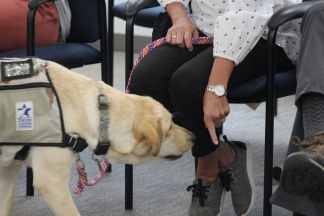
J.J. is 16-months old and was named after Jesse Jack Martinez, a U.S. Army Private First Class who died in Iraq in July 2004. Both dogs had the opportunity to interact with our veteran participants in an exercise of being called over, making eye contact, responding to “sit” and then of course—THE REWARD!
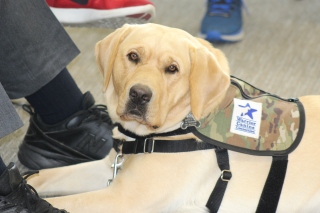
In less than an hour, clearly, all our veteran participants were charmed by Beverly and J.J. and found petting and playing with them to be highly therapeutic. Outreach Manager Mallary Lass, USAF Ret. with the Cohen Clinic said that many of our clients have already been asking us about service dogs, and animals have been known to be extremely helpful within the therapeutic community. This event was an opportunity to bring that to Cohen Clinic clients.
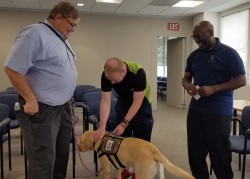 “I am interested in training service dogs because I know it worked for me. My dog was given to me as a therapy dog and she’s been my lifesaver. She helps me with a lot of my issues and I just see this as a great way to give back,” said Derrick, U.S. Army veteran.
“I am interested in training service dogs because I know it worked for me. My dog was given to me as a therapy dog and she’s been my lifesaver. She helps me with a lot of my issues and I just see this as a great way to give back,” said Derrick, U.S. Army veteran.
All selected service dogs go through an initial training with a puppy parent that lasts about 18 months before moving onto more advanced training. It is estimated that by the time one WCC canine is finished with training, he or she would have helped up to 60 warriors throughout the process.
Warrior Canine Connection utilizes its Mission Based Trauma Recovery model to empower returning combat veterans who have sustained physical and psychological wounds while in service to our country. Based on the concept of warriors helping warriors, WCC’s therapeutic service dog training program is designed to mitigate symptoms of post-traumatic stress disorder, traumatic brain injury, and other challenges, while giving injured combat veterans a sense of purpose and help in reintegrating back into their families and communities. As part of their training, veterans have the responsibility to teach the dogs that the world is a safe place. Through that process, they must convince themselves of the same.
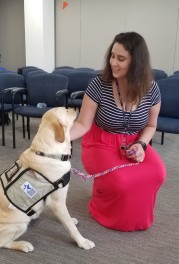 “This partnership is a win-win for both The Steven A. Cohen Military Family Clinic at Easterseals and the Warrior Canine Connection because it allows both organizations to help our wounded warriors find the best way to bring joy back into their lives. For the Cohen Clinic, helping veterans get better is more than just managing the mental health aspect of it. It is also about helping veterans find wellness, which is just as important,” said Mallary Lass, USAF Ret., Outreach Manager with the Cohen Clinic.
“This partnership is a win-win for both The Steven A. Cohen Military Family Clinic at Easterseals and the Warrior Canine Connection because it allows both organizations to help our wounded warriors find the best way to bring joy back into their lives. For the Cohen Clinic, helping veterans get better is more than just managing the mental health aspect of it. It is also about helping veterans find wellness, which is just as important,” said Mallary Lass, USAF Ret., Outreach Manager with the Cohen Clinic.
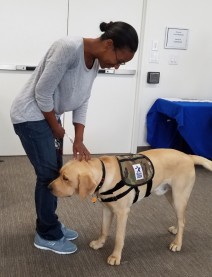 “I’ve been trying to involve myself in more stuff. So when the Cohen Clinic sent me the information, I thought it would be a good chance to work on socializing myself after I came back with my trauma. With this program, I also like that I can be flexible with my commitment and maybe participate once a week. Plus, I like the idea of giving back to the veteran community,” said Natalie, U.S. Army veteran.
“I’ve been trying to involve myself in more stuff. So when the Cohen Clinic sent me the information, I thought it would be a good chance to work on socializing myself after I came back with my trauma. With this program, I also like that I can be flexible with my commitment and maybe participate once a week. Plus, I like the idea of giving back to the veteran community,” said Natalie, U.S. Army veteran.
Veterans interested in the program can volunteer by working alongside a professional trainer to assist in the training process for a fellow veteran.
The Cohen Clinic is also working with the Warrior Canine Connection on an eight-week training session that will be open to our veteran community. For more information on the session, please contact Outreach Manager Mallary Lass at mlass@eseal.org.
For more on the Steven A. Cohen Military Family Clinic at Easterseals, please go to our website at mfc.eseal.org.